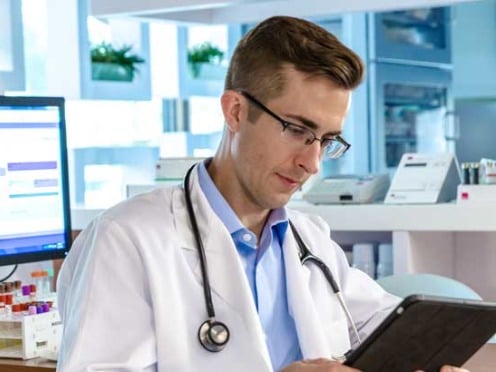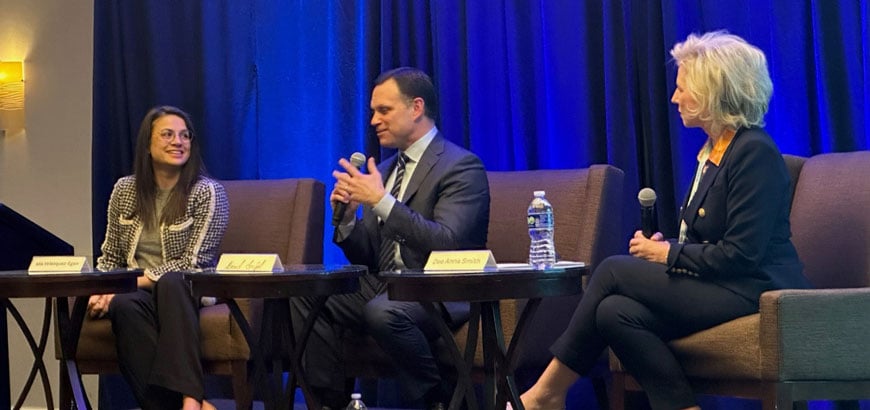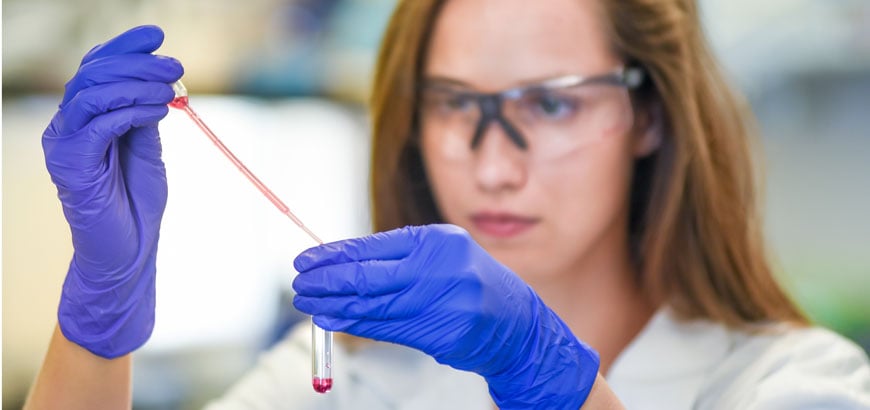
Explore the latest trends shaping the future of cell and gene therapy and learn what’s needed to ensure innovation reaches patients.

Guided by our values, we are an impact-driven organization that improves care in every setting – one product, one partner, one patient at a time.
Through our core commitments, we are leveraging our scale for the greater good, such as serving the needs of our stakeholders, donating back to our communities, protecting our planet, working with policymakers, and more.
Every year, we publish updates to our commitments through our Impact Report.
Download Our Impact ReportOur businesses bring together leading technologies, innovative solutions and hands-on expertise to support the entire healthcare ecosystem.
We distribute pharmaceuticals and medical supplies to healthcare settings across North America, from pharmacies and hospitals to doctors’ offices and clinics.
We help to ensure the financial wellbeing of pharmacies and health systems and support a stable work environment for their employees.
We provide research, insights, technologies and other support to help address challenges in cancer and specialty care.
We provide a suite of solutions designed to address access, affordability and adherence challenges by bridging the gaps between biopharma companies, pharmacies, providers, and payers to help patients get on and stay on their medications.
We offer solutions that enable employers, payers, health-plan brokers and government agencies to provide lower-cost options for prescription medications and therapies.
We help to ensure the financial wellbeing of pharmacies and health systems and support a stable work environment for their employees.
Every year, we publish updates to our commitments through our Impact Report.
Download Our Impact ReportReal-world data gleaned from electronic health records is helping speed specialty drug development..

Read time: 4.5 minutes
For decades, clinical trials have long served as a prerequisite for how therapies are approved for commercial use. Yet clinical trials often fail to reflect the actual patient population beyond a trial setting. Challenges that face clinical trials can include insufficient patient diversity, a lack of accessibility to trial locations, poor health education, and limited awareness of available trials within local communities. This means the population taking part in a clinical trial may not truly reflect the population ultimately taking the drug in the real world.
Fortunately, there’s another promising option beyond the data gathered from clinical trials that researchers are using to evaluate much-needed cancer drugs in development.
Enter real-world data (RWD). RWD is information collected as a matter of course during a patient’s treatment—including, in some cases, the very same data a clinical trial would collect. In cancer research, this data could include diagnoses, disease stage, cancer progression, treatment and reactions to medications. It can be gleaned from electronic health records (EHRs), insurance claims, and even mobile devices and fitness trackers.
Analyzing RWD yields real-world evidence (RWE). Both types of information offer vast promise, something the federal government recognized in 2016 when the 21st Century Cures Act laid the groundwork for the use of RWD and RWE to support FDA decisions about new medical devices or drug indications.
“There has been a proliferation of data sources that provide information around patient health and their interactions with healthcare systems,” says Vasu Chandrasekaran, vice president of real-world data and analytics at Ontada, a McKesson business that specializes in oncology data science and technology. “Leveraging real-world data can provide a comprehensive understanding of the effectiveness of new drug therapies.”
Let’s look at how RWD can be put to use. Say a biopharma company has a new drug that targets a rare mutation in cancer. It’s ready to be tested in a clinical trial of 100 patients who will be compared with another 100 who received an older, standard-of-care medication.
“If the only patients eligible for the trial are those with the specific genetic mutation the drug is designed to target, it’s very hard to get enough patients to do a prospective randomized trial,” says Marcus Neubauer, M.D., chief medical officer for The US Oncology Network.
That’s where a retrospective, standard-of-care trial comes in. In this type of trial, enough past patients exist to assemble a historical control group. These anonymized patients have already been treated with the standard-of-care medication, so data collected during their care, which is easily gathered from a practice’s EHR, can be used in the trial.
These patients’ outcomes—how their cancer responded or how long they lived—can then be compared with those of the 100 counterparts who are currently receiving the investigational drug. Statistical methods can ensure the two groups are reasonably comparable. The resulting information can help demonstrate to regulatory agencies that a new therapy is safe.
In 2017, McKesson prepared and supplied analysis from a standard-of-care trial for a drug that treats metastatic Merkel Cell Carcinoma (mMCC), a rare form of skin cancer. The trial helped establish the first-ever FDA approval of a first-line therapy for mMCC. It was the first time that RWD, which in this case was pulled from Ontada’s iKnowMed EHR, was part of a regulatory approval in oncology.
“Seeing the field evolve to where real-world data is gaining more and more acceptance for demonstrating the benefits and risks of drug products is what motivates my team.”
Precision medicine—an approach in which an individual’s genetics, environment and even lifestyle are factored into their treatment—is another area that has benefited from the use of RWD and RWE.
Imagine you’re an oncologist with an elderly patient whose cancer has a rare mutation, one you’ve seen only a few times in your career. How will that cancer respond to standard treatment? After all, no clinical trial has examined this very unique group of people.
Real-world data comes to the rescue. You can use an EHR, like iKnowMed, to gather the records of patients who share the same mutation, then examine how they responded to a particular drug regimen. Did they experience complications? How long did it take their cancer to progress?
“All of a sudden, you’ve learned a lot more about this particular drug in the real world,” says Dr. Neubauer. “If you learn, for example, that nobody over age 70 benefited from that drug, you might decide to personalize your patient’s treatment by avoiding it.”
Real-world data, Chandrasekaran says, can help biopharma companies determine “those additional factors, those comorbidities that could play impactful roles in either the effectiveness of the drug or the overall outcomes a patient might experience.”
Amid the patient barriers that leading therapies can face, real-world data provides many of them a map – both for clinical trials and for the rapidly expanding horizons of precision medicine.
“With all the information available, it’s a question of, ‘Why would we not be using this data?’,” says Chandrasekaran. “Seeing the field evolve to where real-world data is gaining more and more acceptance for demonstrating the benefits and risks of drug products is what motivates my team.”
With regard to McKesson’s mMCC RWD-enabled approval, he adds, “There are people alive today because they got the drug. I tell my team, ‘You may not be seeing patients in clinic. But you are saving lives.’”

Explore the latest trends shaping the future of cell and gene therapy and learn what’s needed to ensure innovation reaches patients.
Explore the latest trends shaping the future of cell and gene therapy and learn what’s needed to ensure innovation reaches patients.

Key insights on how keeping specialty and infusion services in health systems can transform patient care in the hospital setting.
Key insights on how keeping specialty and infusion services in health systems can transform patient care in the hospital setting.

A McKesson employee and cancer survivor’s story of resilience and the power of empathy.
A McKesson employee and cancer survivor’s story of resilience and the power of empathy.

Ontada is an oncology technology and insights company committed to advancing cancer research and care by connecting life sciences partners, providers and patients.
Ontada is an oncology technology and insights company committed to advancing cancer research and care by connecting life sciences partners, providers and patients.

Top insights from the Endpoints at ASCO McKesson leadership panel
Top insights from the Endpoints at ASCO McKesson leadership panel

Insights and Takeaways for The Next Chapter in Specialty Medicine from Asembia AXS25
Insights and Takeaways for The Next Chapter in Specialty Medicine from Asembia AXS25

Enhancing patient access and engagement in clinical trials.
Enhancing patient access and engagement in clinical trials.

Learn how InspiroGene is helping deliver revolutionary cell and gene therapies to patients in need.
Learn how InspiroGene is helping deliver revolutionary cell and gene therapies to patients in need.

Insights from the 2025 CoverMyMeds Medication Access Report, From Barriers to Bridges
Insights from the 2025 CoverMyMeds Medication Access Report, From Barriers to Bridges

Learn about the crucial role Sarah Cannon Research Institute (SCRI) played in helping a patient overcome prostate cancer.
Learn about the crucial role Sarah Cannon Research Institute (SCRI) played in helping a patient overcome prostate cancer.